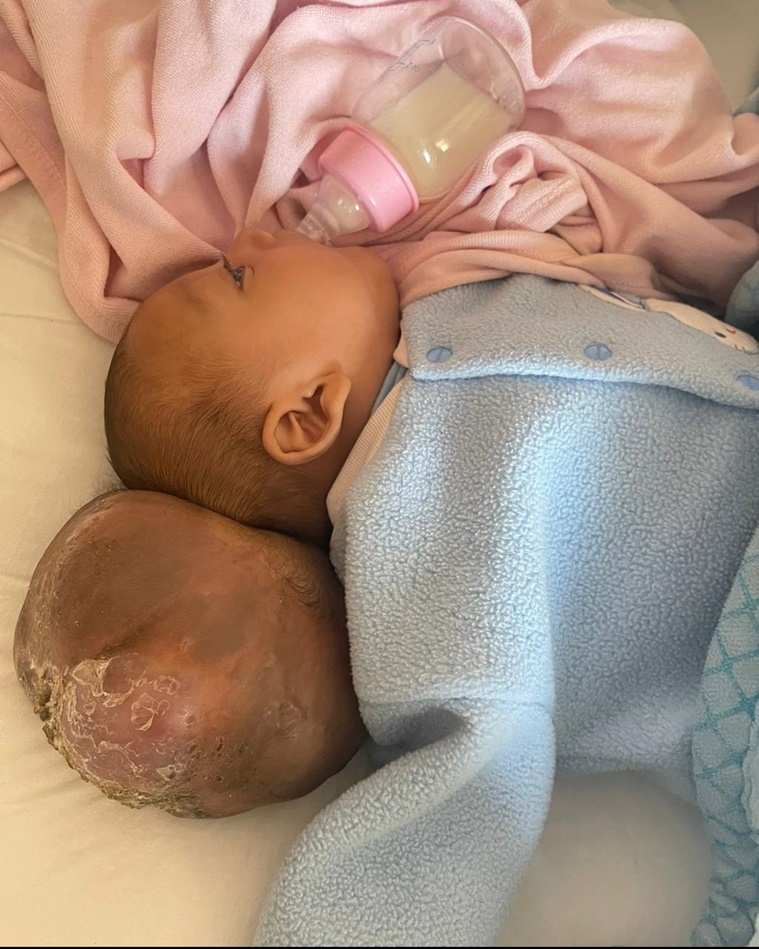How folic acid during pregnancy can prevent brain cyst of the type AIIMS doctors removed in baby
‘While we saved the baby’s brain in a rare reconstructive surgery, we found the parents didn’t take any folic acid tablets. It is a well-known fact that folic acid tablets must be taken when someone is planning pregnancy (periconceptional period ) to prevent foetal neural tube defects,’ says Dr Deepak Gupta, professor of neurosurgery, AIIMS
 Abid Azad travelled all the way to Delhi, where doctors at AIIMS attempted a rare surgery and saved the life of his son.
Abid Azad travelled all the way to Delhi, where doctors at AIIMS attempted a rare surgery and saved the life of his son. When Abid Azad had twin sons, he celebrated like any father would. But three months down the line, he had not counted that he could lose one of them. One of the twins, Arhat Aydin, had a giant encephalocele or cyst that had spilled out of his brain. It had become bigger than his head and was threatening to sap the life out of him. Refused by many experts, Azad, a Bangladeshi, travelled all the way to Delhi, where doctors at AIIMS attempted a rare surgery and saved his life.
“I contacted many doctors at private hospitals in Delhi but they refused treatment. I checked for surgery options in other countries, including Thailand, but the treatment cost was very high,” says Azad, a communication specialist at USAid in Bangladesh. As a last resort, he came to AIIMS while his wife, Sadia Yeasmin, stayed back to take care of the other twin and their six-year-old son. He fed, cared for and watched over his son till he was wheeled into surgery. What do we know of this rare genetic defect?
WHAT IS AN ENCEPHALOCELE?
According to the Centers of Disease Control (CDC), encephalocele is a sac-like protrusion or projection of the brain and the membranes that cover it through an opening in the skull. It happens when the neural tube does not close completely during pregnancy and is rare birth defect. The result is an opening anywhere along the centre of the skull from the nose to the back of the neck, but most often at the back of the head, at the top of the head, or between the forehead and the nose. In short, it stunts brain development. In some cases, cerebrospinal fluid or the membranes that cover the brain (meninges) may also leak out of this gap into the thin sac, threatening a rupture.
Most encephaloceles are large and can be diagnosed before birth. However, in extremely rare cases, some encephaloceles may be small and go unnoticed.
HOW AIIMS DOCTORS OVERRODE THE CHALLENGE
The surgery was conducted by a team of doctors headed by Dr Deepak Gupta, professor of neurosurgery, at AIIMS Delhi on December 12.
“We noted that there was cerebrospinal fluid leaking from the sac. The baby had a history of pus discharge from the sac and he had a large swelling at the back, which caused difficulties in positioning, feeding and nursing him. There was a fear that the sac containing brain tissue could rupture anytime. This could cause meningitis and result in the infant’s death,” he said. Dr Gupta and his team then attempted skull reconstruction of a unique kind. During the three-hour long surgery, they removed the cyst and covered the functional part of the brain by expanding the skull. “After evaluating the baby’s condition, we decided to perform the surgery. On December 12, the operation was done during which the non-functional protruding part of the brain, which had taken the shape of a cyst, was excised, all normal brain tissues were preserved and expansile cranioplasty was done, giving space to the brain to continue to grow in future,” Dr Gupta said.
 Arhat Aydin had a giant cyst that had spilled out of his brain and had become bigger than his head.
Arhat Aydin had a giant cyst that had spilled out of his brain and had become bigger than his head.
WITH SURGERY THE ONLY OPTION, WHEN SHOULD ONE GO FOR IT?
According to CDC, surgery is usually performed sometime between birth and four months, depending upon the size, location and associated complications as well as whether a layer of skin covers the encephalocele. If the skin is thick enough to act like a protective cover, then surgery can be delayed for a few months. But in Arhat’s case, the skin was too thin.
The surgery protocol usually involves putting back the protruding contents of the encephalocele back into the skull. The neurosurgeon usually removes a portion of the skull, allowing access to the brain. Then, he cuts through the dura mater, the tough outer covering of the brain, pushes back any herniated portion of the brain, meninges and fluid back into the skull and removes the surrounding sac. It is important to note that surgical correction can be done in such cases without further functional disability. Some cases might need more than one surgery.
According to the National Organisation for Rare Diseases (NORD), “Additional treatment is based on the specific symptoms present in each individual case. Hydrocephalus may be treated by surgically implanting a shunt that allows excess cerebrospinal fluid to be drained.”
CAN THIS BIRTH DEFECT BE ARRESTED?
Dr Gupta says that in this case, the parents didn’t take any folic acid tablets and it is a well-known fact that folic acid tablets must be taken when someone is planning pregnancy (periconceptional period) to prevent foetal neural tube defects.
He adds that women intending to be pregnant should consume 400 micrograms of folic acid every day day from fortified foods or supplements or both in addition to that obtained through a normal diet. They may supplement it with Vitamin 12 too.
The surgery was done under Universal Health Coverage Day initiative, an initiative of the United Nations and WHO to make health accessible to all across the universe. Abid says that six days after surgery, the baby is doing well and is likely to be discharged Monday.
“All the doctors told me that skull reconstruction cannot be done but today my child is safe and healthy post the surgery. We will stay in Delhi for another week till the time his stitches are removed but if another surgery is required, we might stay for a few days more,” says Azad. “They are brave parents managing the two infants across two nations,” adds Dr Gupta.
- 01
- 02
- 03
- 04
- 05



























